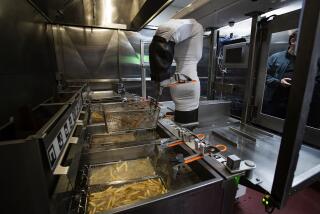Labor Shortage Is Opportunity in the Making
- Share via
McDonald’s is paying $6 an hour for counter help in Burlington, Vt. In Boston, computer-skilled people can hardly be hired at any wage. Nurses for U.S. hospitals are being recruited from as far away as China.
Welcome to the 1990s, the decade that promises to be the reverse of the past two. Then, the worry was to create jobs for all the Baby Boomers entering the work force. Now, the Baby Busters of 1965 to 1978 are coming to work, and there are fearful predictions of labor shortages and dire consequences ranging from chronic wage inflation to slower economic growth.
The trend is in the numbers. There are fewer teen-agers so McDonald’s, in some areas, has to pay more than its $4.60 an hour average to attract counter workers. The Labor Department projects 21 million additional workers, an 18% expansion, for the U.S. labor force in the years 1986 to 2000. That’s a dramatic slowdown from 1972-86, when 31 million people expanded the labor force by 35%.
And inflation already is rising. Economist John Paulus of Morgan Stanley sees inflation reaching 6% by the end of 1989, to be curbed only by a recession in 1990.
However, says Daniel Mitchell of UCLA’s Institute of Industrial Relations, that’s the business cycle at work, not teen-agers. Young people, who hold marginal jobs, don’t cause inflation and recessions.
And longer term, fears of labor shortages and dire consequences are overblown. Yes, there will be fewer new workers. But that tighter labor supply will cause other things to happen. Employers will find they can do with fewer workers because of new machinery and new ways of using employees. The result could be renewed productivity growth in the U.S. economy.
The labor-tight ‘90s could see other happy consequences. There will be a shift away from forced early retirement. “It will be imperative for business to extend the work life of its reliable staff during the coming decade,” says Mitchell Fromstein, president of Manpower Inc., a temporary-help firm.
What you’ll see is more training and attention to lower-level employees, the foot soldiers of industry--a welcome relief from the past decade’s stream of books and comment analyzing management. Now attention will turn to the people who work the machines. “You’re already seeing articles proclaiming that older workers can be taught to work with high-tech machinery,” remarks UCLA’s Mitchell.
Flexible scheduling will be needed for older workers, but that’s alrea dy happening with younger people. Manpower and other firms are able to supply temporary employees to business because they tap into a flexible work force of Baby Boom mothers, who appreciate the chance to vary their hours.
Skills Mismatched
Such temporaries frequently supply needed computer skills, for which there is great demand but too few qualified workers--a shortage that promises increased training but hardly wage inflation. “I don’t think North America has a labor shortage so much as a mismatch of skills,” says Austin Thorne, secretary of the Canadian Federation of Labor, who predicts that “retraining employees rather than restructuring corporations” will be the hot activity of the 1990s.
But the U.S. economy needs other workers who require years of apprenticeship or education. That’s why nurses are being recruited from overseas. And that’s why immigration policy is shifting from a concern for keeping out illegal aliens to legislation aimed at bringing in skilled immigrants. A proposed Senate bill would increase immigration by 20%, or almost 100,000 entrants per year.
Great. But talk of labor shortages notwithstanding, we still have 5% unemployment--5.7 million people. Are they to be a permanent underclass, forgotten people? No, that doesn’t make sense in a country that needs workers. Somebody will see opportunity--or already has.
ServiceMaster, a Chicago carpet-cleaning firm, saw 20 years ago that hospitals and schools needed janitorial services. And it has prospered--growing to $2 billion in revenue--by training clean-up staffs and bringing skilled-worker respect and status to such work. It has wrought prosperity from a concern for employees. And chances are, the 1990s will do the same. Why should the future be feared?
More to Read
Inside the business of entertainment
The Wide Shot brings you news, analysis and insights on everything from streaming wars to production — and what it all means for the future.
You may occasionally receive promotional content from the Los Angeles Times.









